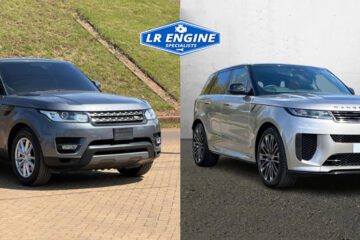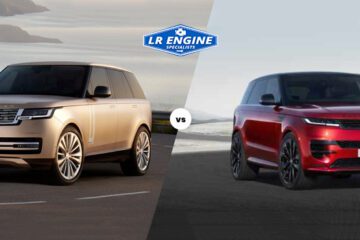Introduction:
The Range Rover Evoque 2.0 engine problems have become a common topic of discussion among owners, mechanics, and enthusiasts alike. As more Evoque 2.0 petrol and diesel variants accumulate higher mileage, the long-term reliability of these engines is under scrutiny. Refined yet rugged, the Evoque seamlessly blends luxury styling with genuine off-road capability, making it perfect for drivers who demand both elegance and endurance. With meticulous care and attention, the Evoque can still deliver the performance and prestige it promises.
Understanding the Range Rover Evoque 2.0 Engine Family
Under the hood, the Evoque has 2.0-litre Si4 petrol and TD4/SD4 diesel engines from JLR’s Ingenium family, built internally for greater efficiency and performance, replacing the previous Ford units. Despite sharing the same displacement, these engines vary in power output and internal units. Diesel variants normally focus on fuel efficiency and torque, while petrol models lean more toward performance.
With the growing interest in second-hand Evoques, the spotlight has turned to how these engines hold up under pressure, especially in the 100,000+ mile range.
How Long Does the Evoque 2.0 Engine Last?
With meticulous care, both petrol and diesel Evoque 2.0 engines can excel 150,000 miles. However, that’s under exemplary maintenance conditions, routine oil changes, timely servicing, and no major ignorance of engine components. High-mileage EVOques will always present a risk if they haven’t been properly maintained, and the history of known concerns must not be overlooked.
Common Petrol Evoque 2.0 Engine Problems
The petrol Si4 2.0 engines are well-known for dynamic performance, but they’re not immune to wear, especially past the 70,000 to 90,000-mile range. The most common reported Range Rover Evoque 2.0 engine problems in petrol variants include:
- Timing chain wear and tensioner failure:
This is a main red flag. The timing chain system in early petrol Ingenium engines is prone to early wear, leading to engine noise, poor timing, and potential catastrophic failure if ignored. Many owners report problems as early as 60,000 miles. When unchecked, this can result in full engine replacement. - Turbocharger failure:
A high-pressure turbo is heart to the petrol engine’s performance. Over time, carbon deposits and oil quality influence its lifespan. Turbo failure generally manifests as loss of power, strange noises, and engine warning lights. It’s most common beyond 80,000 miles without stringent oil maintenance. - Crankcase ventilation issues:
Oil consumption in petrol Evoque 2.0 engines can spike due to defective PCV (Positive Crankcase Ventilation) systems. This issue increases carbon build-up, impacting valves and decreasing engine efficiency. It can often cause premature spark plug fouling and misfires. - Carbon build-up in the intake valves:
Since these engines are direct-injection, there’s no fuel wash over the valves, leading to deposits that hinder airflow. High mileage petrol engines often suffer from performance drops and rough idling due to this.
Despite these concerns, if maintained diligently, the petrol engine can still deliver powerful performance past 120,000 miles, but these Range Rover Evoque 2.0 engine problems in petrol versions can’t be overlooked.
Known Issues in Diesel Evoque 2.0 Engines
The diesel TD4 and SD4 variants are famous for their torque and economy. However, as mileage increases, they develop their own set of persistent issues, especially between 100,000 and 130,000 miles.
- EGR valve clogging and DPF issues:
Diesel combustion leads to severe soot, and the Exhaust Gas Recirculation (EGR) valve is a common point of failure. It blocks over time, causing rough idle, hesitation, and poor fuel economy. Simultaneously, the Diesel Particulate Filter (DPF) can become saturated, particularly in vehicles used for short journeys. - Turbo actuator faults and boost problems:
The VGT (Variable Geometry Turbo) system becomes problematic at high mileage. Actuator arms may seize or electronic controllers fail, triggering boost loss and limp mode errors. These are expensive repairs and common in EVOques around the 100K mark. - Timing belt wear (on earlier Ingenium versions):
Unlike the petrol models, some diesel Evoque 2.0 engines use timing belts, which are supposed to be long-life but have been reported to degrade due to oil contamination. A snapped belt results in irreparable engine damage. - Injector seal leaks and fuel system problems:
Injector seals tend to leak combustion gases into the cylinder head, leading to blow-by and carbon build-up. Over time, this can degrade engine efficiency and create misfires or hard starts.
While diesel engines are often touted as longer-lasting, these concerns make clear that preventive maintenance is necessary for achieving 150K+ miles on a diesel Evoque 2.0.
High Mileage Warnings: What to Watch Out For
Both petrol and diesel models start showing similar age-related issues after 100,000 miles: Maximised oil consumption and turbo lag
>> Blocked EGR or PCV systems are causing rough idling.
>> Timing-related noise and poor engine response
>> Reduced fuel economy and check engine lights
These signs often point to worn components that need quick attention. For buyers or current owners, skipping a meticulous inspection on a high-mileage Evoque could result in engine failure or expensive repairs down the line.
Can a High-Mileage Evoque Still Be a Good Buy?
Yes, but only under stringent conditions. If the Evoque has a recorded service history, timely oil changes, and proactive repairs, it can be a smart investment. Both petrol and diesel Evoque 2.0 engines can be reliable past 150,000 miles if these benchmarks are met. Avoid models with skipped services or unclear maintenance records. Pay meticulous attention to whether the timing system, turbo, and emissions components have been replaced or serviced.
More importantly, always select professional diagnostics and compression testing before buying a high-mileage Evoque. These steps show much about the engine’s internal condition and can help avoid unexpected repairs.
The Cost of Engine Repairs vs Replacement
Should your high-mileage Evoque 2.0 engine develop terminal issues, the price of repair can range from moderate to astronomical. Timing chain kits, turbochargers, and fuel system overhauls can easily cross into the thousands. In some situations, a complete engine replacement becomes more affordable.
Many owners choose reconditioned or remanufactured engines. These not only restore performance but often come with warranties that make them safer than risking ongoing repairs. However, only reliable specialists should perform such replacements to maintain vehicle integrity and resale value.
Maintaining Longevity: Best Practices for Evoque 2.0 Engines
The key to prolonging engine life is preventive maintenance. Use only manufacturer-recommended oils, change filters timely, and avoid long intervals between services. Diesel owners should routinely clean or regenerate their DPF systems. Petrol users should consider valve cleaning services to combat carbon deposits.
It’s also vital to perform regular diagnostic scans, specifically on high-mileage models. Early detection of timing or turbo issues can prevent severe failure. Always follow Land Rover’s updated service schedules, which sometimes include early timing chain checkups due to recurring issues.
Final Verdict
While the Range Rover Evoque 2.0 engine problems are real and various, they don’t make the vehicle inherently unreliable. Most problems stem from neglect, delayed service, or poor maintenance habits. When meticulously maintained, both the petrol and diesel models can go well beyond 150,000 miles, offering ideal returns on ownership.
However, neglecting the warning signs, oil leaks, timing rattle, black smoke, and check engine lights, the expenses escalate quickly. Understanding the known engine problem is the first step toward responsible ownership and longevity.
Even if you’re aiming to prolong your Evoque’s life or planning to buy a high-mileage model, knowing the red flags and taking proactive action is necessary.
Suppose you’re experiencing Range Rover Evoque 2.0 engine problems, especially on high-mileage petrol or diesel models. In that case, LR Engine Specialists offer professional diagnostic services, repairs, and complete engine replacements designed for the Evoque. With deep experience in Land Rover engines and an unwavering commitment to quality, our team guarantees your Evoque stays powerful and durable, no matter how far it’s driven.
Conclusion
Reliability in the Range Rover world is not a myth, it’s rooted in mechanical brilliance. Among the diesel offerings, the 4.4L TDV8 has continuously proven itself as a durable, low-maintenance engine that thrives under pressure. For petrol enthusiasts, the 5.0L Supercharged AJ133 represents the apex of power and longevity, particularly in its refined post-2013 form.
At the end of the day, selecting a Range Rover engine isn’t just about horsepower, it’s about balancing performance, price, and trust. For those looking for the most reliable Range Rover engine, these two choices should top your list.
If you’re in the market for a replacement engine or need expert suggestions on servicing your Range Rover powertrain, trust the professionals at LR Engine Specialists. With deep expertise in both petrol and diesel models, they guarantee your vehicle stays on the road with confidence and precision.
FAQs:
How long does a well-maintained Evoque 2.0 engine typically last?
With meticulous maintenance, both petrol and diesel Evoque 2.0 engines can last 150,000–200,000 miles. Longevity depends heavily on service history and early problem detection.
What is the most common engine issue in high-mileage petrol Evoques?
Timing chain tensioner failure is a weak point, often surfacing before 100,000 miles. Ignoring it risks total engine failure.
Are diesel Evoque engines more reliable than petrol?
Diesel engines often last longer due to their lower RPM operation, but experience EGR and DPF issues. Petrol engines are smoother but prone to timing and carbon build-up problems.
Is it worth buying a high-mileage Evoque?
Yes, if it has a full service record and passes a compression or diagnostic test. Avoid models with unknown maintenance history or deferred repairs.
Can you repair or replace a failing Evoque 2.0 engine affordably?
Repairs such as turbo or timing chain fixes can be expensive, but manageable. In severe cases, a reconditioned engine may be more affordable long-term.


